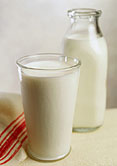
WEDNESDAY, July 18 (HealthDay News) — Allergy shots have long been a mainstay in treating certain allergies, but until recently immunotherapy hasn’t been an option for people with food allergies — where the focus for patients and parents has been on avoiding the food entirely. Findings from two small new studies, however, show promise for the future of treating some food allergies.
Oral immunotherapy means gradually exposing a person to higher doses of the food protein — such as egg protein — that is their trigger for severe allergic reactions. By having the person consume the protein in a carefully controlled setting — where they can receive emergency medical treatment if needed — the goal is to build up a tolerance to the food over time.
Although oral immunotherapy doesn’t appear to be a panacea, it may be an effective alternative for certain people with a variety of food allergies. The current studies looked at treating children with egg allergies and milk allergies.
The egg study included 55 children allergic to eggs, 40 of whom received a special oral egg immunotherapy daily for up to two years. Eleven of the 40 were able to consume eggs without having a reaction as much as three years later.
The milk study included 12 children allergic to cow’s milk who were given small amounts of milk daily in a clinic for six weeks. All of the youngsters eventually were able to drink two glasses of milk a day, according to the study.
“Parents should have a feeling of optimism that there is a lot of work and effort going into active therapies for food allergies,” said Dr. Todd Green, a food allergy specialist and an assistant professor of pediatrics at Children’s Hospital of Pittsburgh. He was not associated with the new studies.
Green added a note of caution, however: “At this point, these treatments aren’t ready for widespread use, and they’re not ready for home therapy.”
Results of both studies appear in the July 19 issue of the New England Journal of Medicine.
Egg and milk allergies are among the most common food allergies, according to the American Academy of Allergy, Asthma and Immunology. Although the traditional treatment for food allergies is to avoid the food to which you’re allergic, milk and eggs are common ingredients in many foods, making it difficult to strictly avoid them.
Many youngsters outgrow these allergies. According to the milk study, as many as 70 percent of children with a milk allergy will outgrow it by age 3. But for some, egg and milk allergies persist, posing a potentially life-threatening danger from accidental exposure.
Children in the egg study were all between 5 and 11 years old. Fifteen of the children were given a placebo; the remaining 40 were given a daily dose of oral egg-white immunotherapy for 10 months.
After 10 months, the children were given an oral food challenge test containing 5 grams of egg-white powder. None of the children on placebo passed the test, but 22 of the 35 children still taking oral immunotherapy passed the challenge. (Five children dropped out of the treatment group before the oral challenge.) The treatment group continued receiving daily oral immunotherapy, while the placebo group was allowed to stop taking the placebo.
At 22 months, children were given another food challenge test. This time they consumed 10 grams of egg-white powder — about the equivalent of large egg. Thirty children passed the test this time.
Those who passed were taken off immunotherapy, and then given a food challenge test again two months later to see if their allergy would return. Eleven children passed this test, and were considered cured of their allergy. The researchers followed up with another challenge test in a year, and all 11 remained free of any allergic reaction to eggs.
Most side effects children experienced occurred within the first 10 months of the study. There were no severe reactions, the researchers said, but about three-fourths of children receiving the therapy had allergic reactions involving their mouths or throats, compared to one-fifth of children in the placebo group.
“We took a group of children at an age where they weren’t going to outgrow their egg allergy, and by the second year 75 percent could tolerate eggs,” said the study’s lead author, Dr. A. Wesley Burks, chairman of the department of pediatrics at the University of North Carolina at Chapel Hill. “About 30 percent of the original group passed the third challenge and can now eat eggs intermittently without symptoms.”
Burks, who at the time of the study worked at Duke University Medical Center in Durham, N.C., said this type of immunotherapy likely would work with other allergens, such as peanuts.
The current study on milk allergy, which was published as a letter in the journal, took place in Spain. It included 12 children between 2 and 15 years old, all of whom were seriously allergic to milk. The children were given increasing doses of undiluted milk for six weeks.
By the end of 10 weeks, all 12 children were able to drink two glasses of milk daily (about 8 ounces every 12 hours). After two years, all the children were still able to drink a glass of milk every day.
There were certain changes in immune system markers in the children, however, suggesting that the immune system might still be responding in some way to the milk.
“Are there any long-term consequences? I think we’re still trying to understand what’s going on at the cellular level after desensitization, but it seemed like there was still something going on,” Green said.
The bottom line, he said, is researchers just don’t know if these reactions that don’t cause symptoms are doing any harm, or indicate an increased risk for future allergic reactions.
Both Burks and Green cautioned that these studies were done in a very controlled manner, with help readily available, and precise dosing schedules. Parents should not try this at home, they advised.
More information
Learn more about food allergy from the American Academy of Allergy, Asthma and Immunology.

